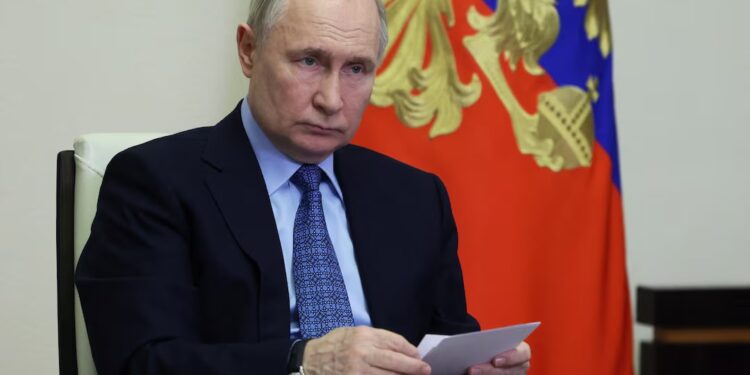President Vladimir Putin has vowed a decisive response after a sophisticated Ukrainian cyber operation, codenamed “Spiderweb,” reportedly disabled large segments of Russia’s critical digital infrastructure, including government servers, railway signalling systems, and military communications across western districts.
The attack, which Russian officials claim occurred in the early hours of Friday, left internal networks at the Ministry of Defence and the Federal Security Service (FSB) intermittently inaccessible for several hours. State-run media were quick to call it the most severe cyber incident on Russian soil since the start of the full-scale invasion of Ukraine in 2022.
Speaking from the Kremlin, Putin denounced the attack as an act of “digital terrorism” and promised “asymmetric countermeasures” against what he described as a “NATO-coordinated Ukrainian provocation.” Without elaborating on the specifics, the Russian president suggested that retaliation would extend beyond cyberspace and could include escalated operations in what Moscow considers “enemy-aligned territories.”
Analysts familiar with the Spiderweb campaign describe it as unusually targeted and well-timed. According to Western intelligence leaks cited in European press, the operation exploited vulnerabilities in legacy Russian operating systems, long criticised for their lack of resilience against modern attack vectors. The Ukrainian Ministry of Digital Transformation has not officially claimed responsibility, but senior Kyiv officials, speaking anonymously, confirmed that “active digital defence measures are ongoing.”
Meanwhile, in Moscow, the State Duma called an emergency session to propose new security protocols for all public sector networks and floated the possibility of disconnecting sensitive institutions from the global internet altogether. Russian cybersecurity firm Kaspersky issued a rare public statement advising clients to assume “temporary loss of data visibility” and to implement zero-trust frameworks immediately.
The incident has also sparked renewed debate within NATO about the risk of escalation in hybrid warfare. A senior NATO official, speaking in Brussels, described the Spiderweb incident as “a preview of what’s coming if diplomatic off-ramps remain ignored.” However, member states stopped short of endorsing any retaliatory cyber campaigns.
For Ukraine, the Spiderweb success is being framed not merely as disruption but as deterrence. After months of intensified Russian missile barrages and cross-border drone raids, Kyiv’s cyber capabilities offer a different kind of leverage. The move signals that Ukraine’s strategy is no longer reactive—it is now proactively seeking to undermine Russia’s ability to wage war, both physically and digitally.
Observers warn that any Russian counterstrike—especially if it affects infrastructure in NATO countries such as Poland or the Baltics states—could raise tensions well beyond the digital domain. As one Estonian defence analyst noted, “If Putin’s response crosses borders, the rules of engagement may change.”
The cyber front of the war, once seen as a sideshow to tanks and artillery, is now clearly in the spotlight. And with both sides escalating their digital arsenals, the conflict’s next major turn may come not from a battlefield, but from a server farm.
newshub finance



Recent Comments